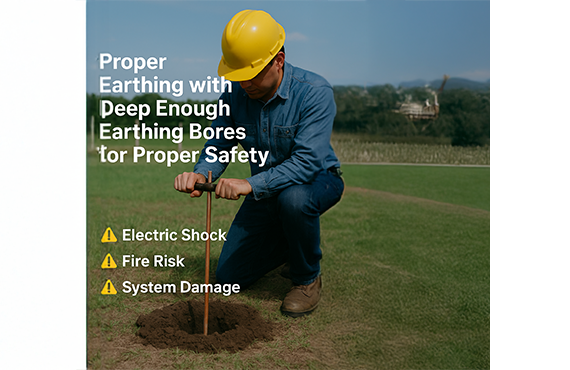As Pakistan embraces solar energy at a record pace, many households and businesses are installing solar panels to cut energy costs. However, a critical safety issue is being ignored by far too many installers: inadequate or shallow earthing systems.
If your solar installer hasn’t mentioned deep earthing bores—sometimes up to 70–80 feet—to achieve proper safety, your system may be exposed to serious risks.
⚡ What is Earthing and Why Does It Matter?
Earthing (or grounding) provides a safe path for excess or fault current to travel into the ground. Without it, you risk:
- Electric shock from metal equipment or panels
- Fires caused by short circuits or power surges
- Damage to solar inverters, batteries, and appliances
A properly designed earthing system ensures safety, improves system stability, and helps you meet global safety standards.
⚠️ The Problem in Pakistan: Shallow and Incomplete Earthing
Many installers in Pakistan either don’t emphasize earthing or use short, ineffective bores. In most urban and dry regions:
- The soil has high resistance, which makes shallow bores (10–20 feet) ineffective.
- Installers skip earth resistance testing, leaving systems vulnerable.
- Low-quality rods or rust-prone materials are often used to save cost.
This shortcut approach can result in complete failure of the earthing system when it’s needed most.
📏 How Deep Should Earthing Be?
To ensure your system is properly grounded:
In most areas of Pakistan, a depth of up to 70–80 feet is required to get less than 5 Ohms of earth resistance — the safe benchmark recommended by international electrical safety codes.
This depth helps access moist, conductive soil layers, improving current dissipation and reducing the risk of electric shock or fire.
🔥 Risks of Improper or Shallow Earthing
If earthing isn’t done correctly, the consequences are serious:
- Shock Hazard – Metal surfaces like inverters or panel frames may become live.
- Fire Risk – Fault currents with nowhere to go can ignite fires.
- System Damage – Inverters, batteries, and appliances can short out.
- Insurance Voids – Improper safety measures can lead to claim rejections.
🧰 What Should Homeowners Ask For?
If you’re getting a solar system installed (or already have one), ask your installer:
✅ Is the earthing deep enough—up to 70–80 feet if needed?
✅ Are they using copper-bonded rods (not mild steel)?
✅ Have they conducted an earth resistance test, and is the result under 5 Ohms?
✅ Is the system connected to all relevant metal surfaces (inverter casing, panels, AC distribution)?
✅ Have you received a proper layout or earthing report?
👷 Final Thoughts: Safety is the Real Savings
Solar energy is a great investment. But it only delivers long-term value if your system is safe.
Earthing may not be visible on the surface, but it’s the foundation of electrical safety. Don’t compromise on it.
Always ensure your earthing bore is deep enough—up to 70–80 feet in most areas—to reduce earth resistance below 5 Ohms and keep your family, home, and equipment safe.


